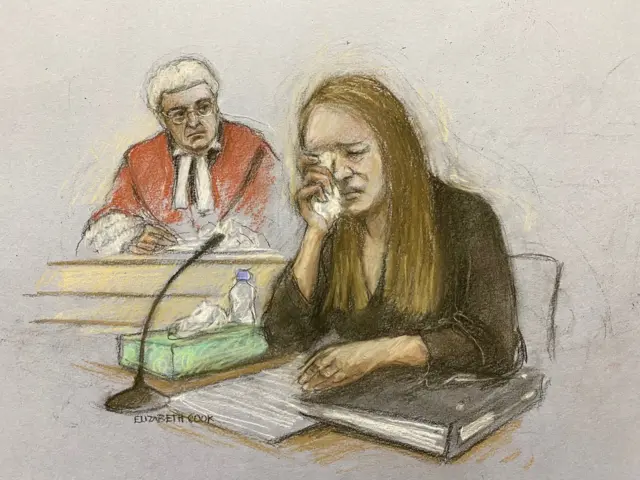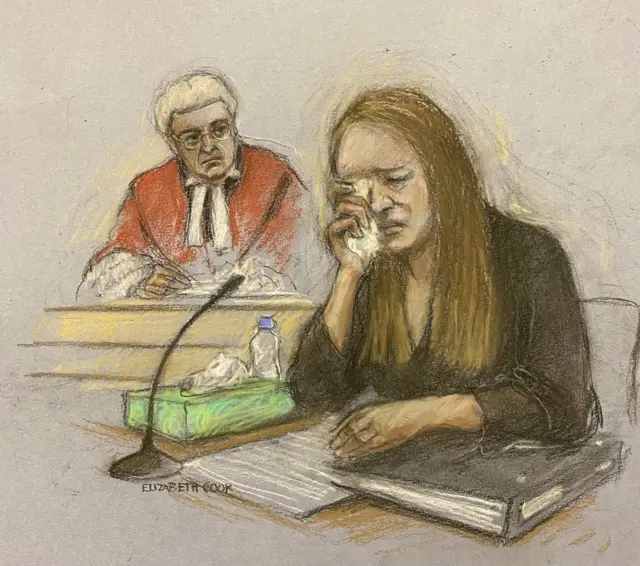Court case resumespublished at 14:04 BST 2 May 2023
The jury and the judge Mr Justice Goss have returned to the courtroom and the case is resuming.
Our correspondents in court will be bringing you the latest.
A nurse accused of murdering seven babies and attempting to kill 10 others is defending herself for the first time at Manchester Crown Court
Prosecutors allege that Letby attacked 17 babies in the neo-natal unit at the Countess of Chester Hospital in north-west England between June 2015 and June 2016
Letby, 33, denies the charges and has told the court the accusations are "devastating"
Jurors have been shown a note written by Letby that says "I killed them on purpose because I'm not good enough" and "I am evil, I did this"
But Letby denies this meant she intentionally killed the babies, saying: "It meant that I didn't think I'd been good enough... and had somehow failed in my duties"
The court has previously heard that Letby was removed from frontline duties in July 2016 after doctors raised concerns
The BBC's Judith Moritz and Dan O'Donoghue are in court and are bringing you the latest here
Edited by Dulcie Lee and Emma Owen
The jury and the judge Mr Justice Goss have returned to the courtroom and the case is resuming.
Our correspondents in court will be bringing you the latest.
There are a number of details that cannot be reported in this case.
The court has ordered that babies and their parents must not be identified, so each child has been named by a letter - from Child A to Child Q.
Media organisations also cannot publish anything else which is "likely to lead" to the identification of either the surviving children or the parents of any of the children involved.
 Image source, Elizabeth Cook / PA Media
Image source, Elizabeth Cook / PA MediaThis sketch of Letby and the judge from today had to be drawn from memory because of legal restrictions
We've been hearing nurse Lucy Letby in court this morning deny murdering seven babies and attempting to kill 10 others. But while the BBC and other news organisations can report on the case, subject to certain legal restrictions, we cannot show you inside the courtroom.
The law changed recently in England and Wales to allow the streaming of a very specific part of a trial process: judges delivering a sentence. But the main part of a trial, where evidence is heard, can’t be filmed - in fact, it’s illegal to take photographs in court.
Authorities believe cameras could act as a distraction, be used to intimidate witnesses and deter people from giving evidence.
The same law bans sketching in court, so court artists have to instead draw from memory, making notes during hearings and leaving the courtroom to actually draw their pictures.
Dan O’Donoghue
Reporting from court
Over the last hour, Lucy Letby has been explaining some of the day-to-day duties nursing staff at the Countess of Chester Hospital were expected to undertake.
She told jurors about the process for taking blood gas readings, how respiratory and cardiac observations were recorded and where certain pieces of equipment were located on the neonatal unit.
Letby explained that there were "lots of jobs to do other than being at the babies' cot side".
She also explained what her relationship with other staff members was like and how she spent her time outside of work.
The nurse told jurors she had "quite an active social life" and used to "regularly attend salsa classes, lunch with friends, holidays with friends and gym".
She was asked about her relationship with a doctor on the unit, who cannot be named for legal reasons.
Letby said he was a "trusted friend" and that the pair would go for walks, meals and coffees together and that he would sometimes come to her house.
Asked if it was any more than a friendship, she said "no".
Her defence barrister Ben Myers KC also asked about Facebook searches she would carry out for the parents of children in this case, as well as others not connected to this case.
Letby said she was "always on my phone" and would carry out searches for parents, colleagues and others "out of general curiosity".
In the month of June 2015, Letby made a total of 113 Facebook searches.
She said this was "just normal behaviour for me", adding: "It’s general curiosity…we do a lot on our phones, I would, out of interest, look up a lot of people."
 Judith Moritz
Judith Moritz
Inside the courtroom
The court is now breaking for lunch. The jury is leaving the room. They've been told to come back at 14:00.
 Judith Moritz
Judith Moritz
Inside the courtroom
Myers continues his questions on Letby's Facebook searches.
"You searched for the parents of Baby D within days of her death. Is that relevant?"
Letby replies: "Yes because it was a significant event."
In August 2015, Letby made a total of 175 Facebook searches for parents, staff and colleagues. Of these there were two searches for a parent on the indictment (the mother of baby twins E and F).
This is a distressing case so if you, or someone you know, need help after reading about it, the details of organisations offering assistance can be found on the BBC Action Line website.
 Judith Moritz
Judith Moritz
Inside the courtroom
Ben Myers KC shows the court a document listing the Facebook searches which Lucy Letby made during the period of the allegations - between June 2015 and June 2016.
The document shows that it's accepted by both sides in the trial that Letby regularly used Facebook to search for:
Myers asks: "Was it unusual for you to search for parents?"
Letby answers: "No".
The court is then shown that on one morning, within three minutes, she searched for the mother of a child from Liverpool Women's Hospital, the mother of a baby at Chester and a doctor from Chester.
The court sees that in the month of June 2015, Letby made a total of 113 Facebook searches for parents, staff and other social things.
She says that when she searched for parents "they were just on my mind".
 Judith Moritz
Judith Moritz
Inside the courtroom
Myers asks Letby: "How well did you get to know parents of babies on the unit?"
Letby replies: "With some families you'd get to know them extremely well. They may be with us for months."
Letby is asked if she had friendships with parents of babies on the unit.
She says: "It was only ever professional when they were on the unit. There have been occasions where I've kept in touch with families once they've left the unit."
She says other staff have done this too, once babies are discharged. Letby is asked: "Do you stop being interested in them once they've left the unit?"
Letby answers "No". She says she used Facebook daily - "I was always on my phone" - and says she'd do Facebook searches for parents of the babies.
"I just think out of general curiosity and they've been on my mind... I've looked at other parents as well" (other than those connected to the babies in this case).
 Judith Moritz
Judith Moritz
Inside the courtroom
Myers now asks Letby: "Do you like to message people? Text?" to which she replies: "Yes".
Myers asks if nursing staff messaged each other, and Letby says "Yes, it was very common, we'd all do it."
She is asked by Myers if that included messaging at work, to which Letby says "yes".
Myers then asks is she was the only one to do so.
"No - all staff used their phones at work. We weren't supposed to in clinical areas," Letby replies.
 Judith Moritz
Judith Moritz
Inside the courtroom
Myers asks Letby: "What was life like outside work?"
"I had quite an active social life," Letby answers.
"I used to regularly attend salsa classes, lunch with friends, holidays with friends, gym... my friends were the only support I had."
Letby is asked about a doctor who she was friendly with. We can't name him for legal reasons.
She says it was a friendship.
Myers asks: "Anything more than a friendship?"
Letby replies: "No."
"Sometimes he'd come to my house, we'd go out for coffee, or walks," Letby adds.
The doctor moved to another hospital. Letby says they stayed in touch "until it fizzled out".
 Judith Moritz
Judith Moritz
Inside the courtroom
Myers asks Letby: "Was there ever a debrief after the loss of a baby?"
Letby says: "Yes, a medical one, run by the consultant in charge on that shift. There wasn't a standard time for this, it could be held after days or weeks. It'd mainly be to see if there was anything we needed to learn from the resuscitation."
Myers then asks: "How did the personal impact feel when a baby died?"
Letby replies: "It was very upsetting, you don't forget things like that. They stay with you".
 Judith Moritz
Judith Moritz
Inside the courtroom
Myers then asks about what support is given to the parents of babies who have died.
Letby says: "There are guidelines but largely it's done by the nursing staff according to the parents - we're there to support them as much as we can. The 'bereavement checklist' is there to help parents make memories."
The court is shown a checklist chart for staff who are looking after newly bereaved parents. Letby's signature is on this particular document - for Baby A in the case.
The checklist includes taking photos of babies, bathing the baby, religious support or baptism, and taking a lock of hair.
Letby says it's a standardised form and other nurses would follow it too. She also says parents were given a memory box after a baby had died, to include hand/foot prints and a teddy bear.
 Judith Moritz
Judith Moritz
Inside the courtroom
Myers asks Letby: "Was there anything that you felt helped you to cope after the death of a baby?"
Letby replies: "At Liverpool Women's Hospital they encouraged you to go back into a nursery (where a baby has died) as soon as possible... because you have to carry on."
 Judith Moritz
Judith Moritz
Inside the courtroom
Myers continues: "The desperately sad nature of this case is that it involves babies who died... and I'm going to ask you questions about them... no insensitivity is intended.
"When there is a death on the unit, what's the impact?"
Letby replies: "It affects everyone on the unit, we're a small unit, working closely together, it affects everyone."
Myers asks: "What support is there after the death of a baby?"
Letby answers: "There's nothing formal, just the nurses between ourselves supporting each other."
Myers says: "Did you send messages to other staff after the deaths of babies?"
Letby replies: "Yes - we leaned on each other."
 Judith Moritz
Judith Moritz
Inside the courtroom
Myers goes on to ask: "Would you know which baby you were going to care for in advance of a shift?"
Letby replies: "No."
Myers then asks: "Could you ask for a specific baby?"
Letby says: "Yes, for continuity of care if you were doing a run of shifts... we try to look after the same baby as much as possible."
Myers moves on to ask: "In terms of your health between June 2015 and June 2016, how was that?"
Letby replies: "Good. I didn't have any time off sick... though I did have inflammation of the optic nerve, with treatment for it in both Chester and Liverpool."
 Judith Moritz
Judith Moritz
Inside the courtroom
Letby is asked how busy it was on the Countess of Chester neonatal unit in the period of these allegations - between June 2015 and June 2016.
She answers: "It was noticeably busier than at any other time on the unit I'd been there.
"We seemed to have more babies with complex needs.
"There was no change in the staffing to cater for it."
She says a full-time worker would do 13 12-hour shifts per calendar month. Days or nights.
Ben Myers KC says: "Were you asked to do more than 13 on some months?"
Letby replies: "Yes... the shifts are usually allocated a month in advance, but they'd change regularly.
"I've been called at a lunchtime and asked if I could work that night."
 Judith Moritz
Judith Moritz
Inside the courtroom
The trial has been running since October last year. The jury of four men and eight women has listened to six months of prosecution evidence which has covered medical and clinical information in huge detail.
Lucy Letby is now being asked about some of this kind of detail. She's currently explaining how a blood gas reading is taken from a baby in the neonatal unit. She's explaining the process.
The jury has become used to looking at observation charts, nursing notes, clinical records, graphs and grids.
The jurors have had to become acquainted with medical terminology relating to a range of different illnesses and conditions, as well as complex detail about the care and treatment of premature and poorly babies on a neonatal unit.
We've just received this court sketch by Elizabeth Cook, showing Lucy Letby wiping away tears as she gave evidence this morning in the witness box at Manchester Crown Court.
 Image source, PA Media
Image source, PA Media Judith Moritz
Judith Moritz
Inside the courtroom
Court has resumed, the jury is coming back in.
To recap, Lucy Letby's barrister Ben Myers KC is asking her questions.
Myers has now turned to ask her about the process of feeding a baby via nasogastric tube.